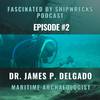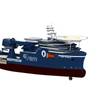Wärtsilä Corporation has been awarded a contract by the French shipbuilder Chantiers de l'Atlantique to supply dual-fuel main engines for a new 153,000m3 LNG carrier.
The LNG carrier has been ordered by the French gas distributor Gaz de France for delivery in October 2005. It will be employed in the shipment of liquefied natural gas (LNG) from Norway or Egypt, but is also designed for the alternative of trading on the spot market.
The vessel will have gas-electric propulsion, with four dual-fuel engines driving generators to supply electricity for the single propeller plant. The engines will burn boil-off cargo gas with a small quantity of liquid fuel for ignition. They will mainly can run on gas with liquid fuel as back-up, and can be switched over automatically as the need arises.
There will be three Wärtsilä 12V50DF engines and a single Wärtsilä 6L50DF engine. They have a combined output of 38.5 MWe, with the 12-cylinder engines each developing 11,400 kW at 514 rpm and the six-cylinder engine 5700 kW at the same speed.
This is the second LNG carrier to have dual-fuel engines and electric propulsion and it shows a consistent and continued confidence from both the shipyard and the shipowner for this new propulsion technology. The pioneering vessel is a 75,000 m3 vessel being built at the same shipyard for the same owner. It was ordered in early 2002 and will have four Wärtsilä 6L50DF dual-fuel engines in a 22 MWe electric propulsion plant.
Gas-electric propulsion plant was chosen because it is more compact than the traditional steam turbine plant used for LNG carriers. This allows the carriage of more LNG within the same size hull and thereby increases the vessel's annual earnings. The Wärtsilä 50DF engines also have clear benefits in terms of fuel efficiency and environmental impact, while multiple engines give a valuable safety and flexibility in operation, with the optimum number of engines running to suit the required service speed.
Whilst making maximum use of the gas fuel (boil-off from the cargo of liquefied natural gas) to develop useful power, Wärtsilä 50DF engines have a much lower fuel consumption overall and thus lower operating costs than the conventional steam turbine plant. The Wärtsilä 50DF engines also have much lower stack emissions than a steam plant. Their low NOx emissions are about one-tenth those of the equivalent diesel engines. The combination of the engines' low fuel consumption and their maximum use of natural gas means the Wärtsilä 50DF engines also have low CO2 emissions.
Technical details of the Wärtsilä 50DF engines and their dual-fuel system
Developed from Wärtsilä's very successful type 46 diesel engines, the Wärtsilä 50DF engines have cylinder dimensions of 500 mm bore by 580 mm piston stroke. Available in configurations with six, eight and nine cylinders in line, and 12, 16 and 18 cylinders Vee-form, the Wärtsilä 50DF engines develop 950 kW per cylinder MCR at 500 or 514 rev/min for 50Hz and 60Hz electricity generation respectively.
The Wärtsilä 50DF engines can be run alternatively in gas mode or liquid fuel mode. The engines are also fully capable of switching over from gas to liquid fuel (marine diesel oil) automatically should the gas supply be interrupted, while continuing to deliver full power.
Gas fuel is supplied at a low pressure (less than five bar) to the engines. In gas mode, the Wärtsilä 50DF engines operate according to the lean-burn Otto process. Gas is admitted into the air inlet channels of the individual cylinders during the intake stroke to give a lean, premixed air-gas mixture in the engine combustion chambers. Reliable ignition is obtained by injecting a small quantity of diesel oil directly into the combustion chambers as pilot fuel which ignites by compression ignition as in a conventional diesel engine.
The Wärtsilä 50DF engines use a "micro-pilot" injection with less than one per cent of the fuel energy being required as liquid fuel at nominal load. Electronic control closely regulates the "micro-pilot" injection system and air-gas ratio to keep each cylinder at its correct operating point between the knock and misfiring limits.
Subscribe for
Maritime Reporter E-News
Maritime Reporter E-News is the maritime industry's largest circulation and most authoritative ENews Service, delivered to your Email five times per week











